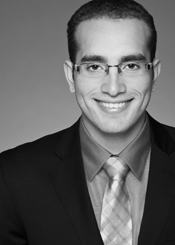 Jordan Hirtle recently spoke with second year student Mahmoud Zeidan regarding majoring in finance at Dalhousie’s Corporate Residency MBA program. The interview focuses on Mahmoud’s experience as a student at Dalhousie so far as well as his career aspirations in the finance industry.
Jordan Hirtle recently spoke with second year student Mahmoud Zeidan regarding majoring in finance at Dalhousie’s Corporate Residency MBA program. The interview focuses on Mahmoud’s experience as a student at Dalhousie so far as well as his career aspirations in the finance industry.
Mahmoud is originally from the Middle East (Gaza Strip) but immigrated to Nova Scotia when he was four and has been a maritimer ever since. He completed his undergraduate degree at Saint Mary’s University with a Bachelor of Commerce, majoring in both finance and accounting.
What made you choose Dal’s MBA and what competitive advantage do you believe the program offers?
I chose Dal’s MBA over the competitors for two major reasons. First, its program and curriculum are unique in the country. I wanted to pursue a career in banking after having some experience in accounting and it was a great transition step for me with the Corporate Residency component of the program. The emphasis on soft skills as a competitive advantage resonates with my development goals as a professional. The Personal and Professional Effectiveness (PPE) curriculum at Dalhousie is excellent.
The second reason I chose Dal is the location of our school. I love Halifax and the East Coast; the student life experience here is one of a kind.
Where did you do your corporate residency?
I completed my corporate residency at Scotiabank Global Banking and Markets with the Corporate Banking Department at the headquarters in downtown Toronto.
I worked as an analyst at CAG (Credit Analytics Group) worked with “Bankers” (Relationship Managers) on establishing new lending products for prospective clients or renewing the terms of current clients at the bank. I worked with several different relationship managers and members of risk management from the following industry sectors (oil & gas, real estate, financial services, power and utilities, telecommunications, mining and infrastructure, and my personal favourite, the diversified industry group) in five offices across the country (Vancouver, Calgary, Montreal, Halifax and Toronto).
What interests you about finance? How did you initially decide finance was the career path you wanted to pursue?
When someone says they are interested in finance it could mean a million different things; each department and type of work can be different, but there are common themes across all different areas of finance. The industry has a fast-paced environment, it is extremely challenging and competitive and I find that very rewarding. One phone call or email can instantly change your strategy on what you are going to tackle that day and personally it keeps me engaged and on my toes, which I enjoy.
I was interested in finance, but was never 100% confident this was the industry I wanted to be in until I tried it out, and I honestly don’t see myself anywhere else for a long time.
What is your dream finance job?
Some people might find this cheesy, but I would love to run a multinational bank one day.
Has the finance professor at Dalhousie influenced your decision in any way? If so, how?
I’d like to give a shout-out to my mentor Dr. Richard Nason; his influence is a major reason I decided on the MBA program at Dalhousie University. Someone with his experience and expertise is a wealth of knowledge; people in finance are usually good at complicating things more than necessary and sometimes ambiguous situations or scenarios are a lot easier to tackle when we apply common sense, empathy and simplicity. He constantly pushes me out of my comfort zone so that I’m capable of facing the challenges that will be presented in my career.
How would you describe your personal style and how does that fit with a role in finance?
People perceive that extroverted, type-A personalities are the only ones who thrive in competitive high-intensity environments. I am significantly introverted, but have been able to use the extroverted aspect of my personality when needed.
Who has influenced you the most? Is this person in the finance industry?
There are a lot of successful people in the finance industry. People like Rick Waugh, Lloyd Blankfein and Mohamad El-Erian inspire me, especially after reading their stories.
Are there any finance books you recommend reading for someone potentially interested in entering the industry?
Reading is absolutely essential to having a successful career in finance. Stay on top of the news by reading the Wall Street Journal, Financial Times, The Economist, Bloomberg and The Globe and Mail.
Well known authors like George Soros or Michael Lewis are followed. There are too many to count, but here are five I would recommend—Liar’s Poker, Boomerang, Monkey Business, Why Genius Failed, Too Big to Fail. If anyone would like a more extensive list, please feel free to reach out to me.
A career in finance can be risky. How do you bring courage and conviction to risky situations?
I think it comes down to your personality—to genuinely believe that nothing worth its value comes easy in our world and that the most influential people in our world today thrive and rise to the occasion, and come up with the best decisions given the risks surrounded by such a decision.
Do you have any additional comments?
Just want to throw my email out there to anyone interested in contacting me to ask more about this wonderful program and about the finance sector. I’d be more than willing to answer a couple of questions. You can email me at zeidan@dal.ca.
Leave a Reply